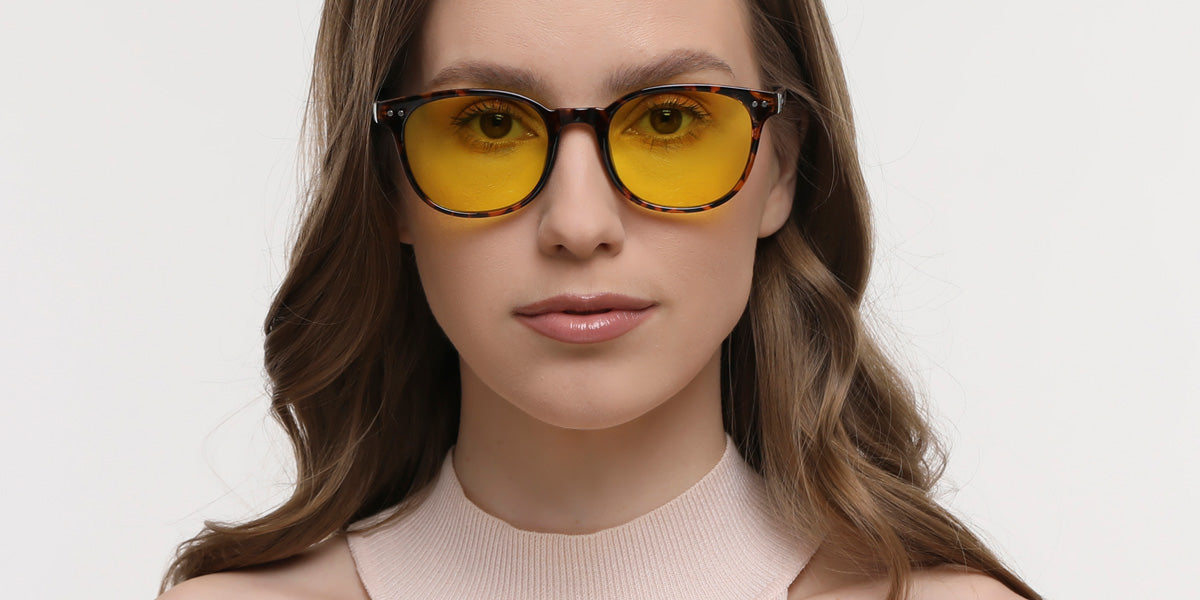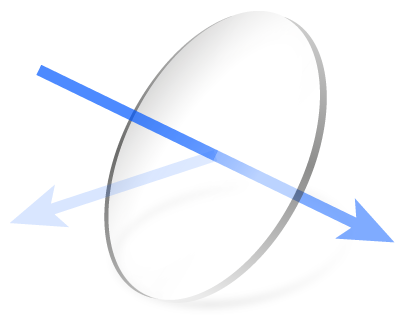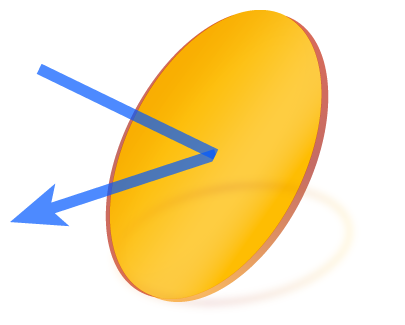Are all Blueblocker glasses coloured yellow?

The answer is clearly no. It's also better to ask the question "Why are some blueblocker glasses colored yellow?" and "Do all yellow lenses also block blue light?"
First of all, the coloring of the lenses does not say much about the filter quality. A good example are ski goggles with yellow coloring. This is supposed to increase contrast and make bumps on the slope more visible in bad weather. Measurements will show that parts of the blue spectrum still come through.
However, it can generally be said that the darker the coloring of the lenses (light yellow-yellow-orange-red), i.e. the "redder" the glasses, the more blue light, or rather, the more wavelengths in the visible spectrum are blocked. Therefore, with dark orange and red coloring, green light is already filtered.
What you can deduce from this, for example, is that transparent lenses can only block a small amount of blue light, light yellow ones probably filter out more than transparent ones, and orange ones a bit more, and so on.
So when do you use which tint now? I present you here a few possible applications:
Clear glasses
There is a wide range of clear glasses marketed as blueblockers.
As I said, these glasses can only filter out a small part. So, if you see advertising claims that these glasses have a filtering power higher than 5-30%, you should be skeptical. Mostly you can find these glasses under the category "computer glasses". They are supposed to protect against dry and strained eyes.
| Glass |
|
||
|---|---|---|---|
| 100% blue light filter performance |
|
||
| Sleep (protection from melatonin suppression) |
|
||
| Stress reduction for the eye (protection of sensitive photoreceptors) |
|
I personally don't think much of wearing glasses during the day, especially when I don't need glasses anyway. It's important to get the full spectrum of light throughout the day, into the eyes and, at best, onto the skin.
For daytime computer work, it makes sense to think about a filter like f.lux or Iris to achieve a similar effect.
However, if your work environment is plastered with bright LEDs and screens and you have trouble getting natural light into your workspace, such glasses may be the right solution.
Yellow glasses

Yellow glasses can already block much more blue light. Since we mainly focus on the time when the sun has already set, you can use these glasses for yourself as driver's glasses in road traffic. Namely, while the darker variants, which we will get to, are not allowed in road traffic, this is possible with yellow glasses (Always make sure that you are actually approved for this). Especially the LED and xenon headlights are a possible problem on the way home, where you actually want to go straight to sleep.
So if you're on the go a lot and still want to be consistent, the yellow glasses are a great choice.
Orange glasses

These glasses are supposed to provide a better sleep. As long as the Blueblocker glasses are of good quality, they can already filter out 100% of the blue light spectrum.
This makes sense because in the historical context, once the sun went down, we had no light. Unless we made a fire. We are very well used to that.
If you look at what kind of light spectrum fire provides, you can see that blue light is hardly represented, if at all. This is a simple explanation to understand why we want to filter this very part of the light to better prepare the body for sleep.
Since we "turn night into day" with modern lighting and screens, our internal clock does not have the possibility to adjust itself correctly and thus to dose the hormone release, especially of the sleep hormone melatonin, which is also called "dark hormone".
So orange glasses help us to better establish the natural context after sunset, in an artificial environment, so that our body gets into a better rhythm and we sleep more deeply.
Dark orange/red glasses

These glasses block another part of the light spectrum, they extend into the green spectrum. With these glasses, you reportedly get tired even faster. Otherwise, just like the orange lenses, they serve to prevent our night from turning into day, but you no longer have such good color rendering.
Conclusion - Are all Blueblocker glasses colored yellow?
No, as we now know very well after the article.
The tint and the quality of the lenses play a role in the right choice of a Blueblocker glasses. In addition, the desired area of application and personal preferences.
The important thing is that the quality of the filter is what the manufacturer promises.
During the day, you should avoid filtering certain wavelengths, unless you are in a completely artificial environment, and that can't be changed quickly. If that's not the case, I'd use a software filter like Iris or f.lux for screen work during the day and provide plenty of natural light. However, if you are very sensitive to light and feel that your eyes are overloaded, give it a try.
As a little tip - always try to look through the window into the distance and give your eyes a little break from the display.
If you ride your bike or car a lot in the evening, the yellow glasses are quite recommendable, as long as the glasses are approved for road traffic.
Otherwise, to protect you from blue light in the evening and prepare your body for the coming sleep, orange or orange-red glasses are the right choice. Especially when you are still sitting in front of the TV, tablet, cell phone, notebook or computer.
Whether orange or red-orange is the right choice for you depends more on personal preference. We recommend combining the two variants, depending on what you have planned for the evening, you can then choose one of the two.
As a little tip - Create a "campfire setting" for yourself in the evening by additionally working a lot with candlelight and relaxed, not too bright light sources.

Free shipping
with DHL within Germany
 Free shipping (DE)
Free shipping (DE) 4.9 / 5 | 950+ ratings
4.9 / 5 | 950+ ratings 30-day money-back guarantee
30-day money-back guarantee









